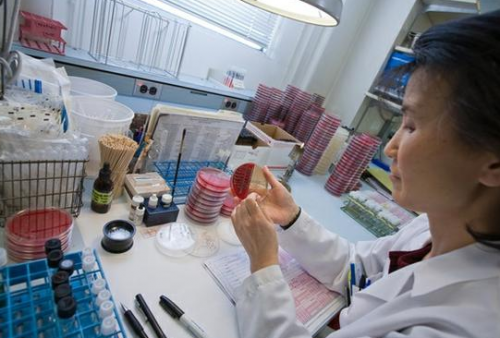During pregnancy, every woman must pay special attention to her health. Unfortunately, the implementation of all the rules and recommendations may not in every case prevent the development of various ailments and pathological conditions. In most cases, expectant mothers have to face such a problem as bacteriuria with.
This disease, like many others, can cause the development of dangerous complications, which in turn will cause a lot of trouble, both for the mother and the unborn baby. In order to prevent negative consequences, let's take a closer look at why and how bacteria appear in the urine, how dangerous they are to the fetus, and how to properly deal with them.
What is bacteriuria during pregnancy
Normally, the urine of a healthy person should be completely sterile, that is, it should not even contain beneficial bacteria. But due to the fact that at the time of pregnancy a woman's body experiences numerous changes, and first of all, there is an active growth of the uterus, all internal organs begin to squeeze each other, thereby disrupting their usual functioning.
Very often, women have to experience discomfort in the abdomen (the intestines are displaced, the stomach and gallbladder begin to hurt). In addition, the most unpleasant is the development of diseases of the urinary tract. First of all, they include bacteriuria.
For pregnant women, this disease is a great danger, so it is so important to diagnose the disease in a timely manner and begin its immediate treatment.
The danger of the development of bacteria in the urine for the expectant mother lies in the fact that pathogens can quite easily move from the uterus to the bladder (after all, they are located very close to each other). If infection of the reproductive organs occurs, then the likelihood of concomitant urinary tract diseases also increases, which in this situation can aggravate the woman's well-being.
Bacteria in urine: where do they come from
To date, the detection in the urine of pregnant women is associated with the course of the following diseases:
- Cystitis. The mucous membrane of the bladder becomes very inflamed due to a decrease in immunity or frequent hypothermia. At the same time, the expectant mother constantly feels the desire to go to the toilet. In advanced cases, there is a sharp increase in body temperature, pain in the lower abdomen and the appearance of bloody discharge in the urine.
- Pyelonephritis. In this situation, the inflammatory process is localized in the renal pelvis. Provoke the development of pyelonephritis can be intestinal or Pseudomonas aeruginosa, as well as pathogenic fungi. At the same time, women have an increase in body temperature, severe chills and pain in the lumbar region.
- Urethritis. Urethritis develops as a result of the penetration of various bacteria and microorganisms directly into the urethra itself, due to which a strong inflammatory process begins along all its walls. The disease is quite dangerous, therefore, it needs urgent drug therapy.
Bacteria in the urine can also appear due to:
- a sharp increase in the size of the uterus (it compresses the kidneys and does not allow it to perform its functions correctly)
- diseases of the teeth and gums
- non-compliance with intimate hygiene
- a large number of sexual partners
- close proximity of the ureter and rectum
Therefore, it is so important to monitor your well-being at the time of bearing a child.
Manifesting symptoms and norms of urine indicators
The results of a urine test of a pregnant woman from a healthy person, in fact, do not differ from each other in any way. This means that in both cases bacteria should not be present in the urine.

The value of the indicator, which will not exceed the number 10 to the 6th power per 1 milliliter, can be attributed to the acceptable limit, but it is not recommended to ignore such a result.
If possible, you will need to undergo medical examinations (ultrasound diagnostics) to confirm the absence of an inflammatory process in the kidneys.
Symptoms of bacteriuria are manifested as follows:
- pain and burning appear at the time of emptying the bladder
- severe nausea and vomiting
- increase in body temperature
- urine becomes cloudy
- strong smell of urine
- involuntary urination
- pain in the back, lower abdomen and bladder
- rapid fatigue and weakness
- begins to secrete pus from the urinary tract
You need to know that bacteriuria can occur without any, which makes it even more dangerous for women's health.
Bacteriuria: what is the danger
Bacteriuria during pregnancy, the effect on the fetus with timely diagnosis and proper treatment does not pose a serious danger to the health of the unborn baby. But if you ignore the manifesting signs of the disease, then the consequences can be negative and at that time irreversible consequences:
- When bacteria appear in the urine, the ureter begins to expand greatly (most often this process occurs in the last months of pregnancy). For this reason, the baby is born with a very low body weight.
- Diagnosing bacteriuria in the urine can provoke a miscarriage or cause premature.
- Bacteriuria can also cause infection of the unborn child itself, resulting in the manifestation of jaundice after childbirth and the course of diseases, the treatment of which is carried out only with the use of antibiotics.
To avoid this, it is important for a woman to regularly see her doctor and take all the necessary laboratory blood and urine tests in a timely manner.
Diagnosis of the disease
Since bacteriuria is not only manifested by certain symptoms, then in order to identify it, it will be necessary to undergo special medical studies, laboratory and consultations of additional specialists.
The most informative diagnostic methods include the following:
- blood test (general)
- blood test (biochemical)
- general urine analysis
- urine test for sterility (culture)
- ultrasound examination of internal organs
- fetal ultrasound diagnosis
If necessary, a woman can be sent for an additional consultation with a nephrologist.
But on the basis of the results of the examinations, the specialist puts the exact one and describes the further treatment. In most cases, it is based on the use of antibacterial drugs.
Smart problem solving
Bacteriuria during pregnancy, treatment is prescribed depending on the severity and well-being of the expectant mother. If the state of health allows, then treatment can be carried out at home, while it is mandatory to regularly see your doctor.
At home, only maintenance therapy is carried out without the use of antibiotics. In this case, special attention should be paid to nutrition, it should consist of those products that will help increase the acidity of urine and stimulate its excretion from the body.
For this you need:
- drink plenty of warm water (helps increase urine density)
- instead of black tea, drink cranberry juice, an infusion based on rose hips or lingonberries
- Tea with lemon will also have a positive effect
- if possible, it is necessary to drink decoctions based on birch buds, juniper, parsley and bearberry
- lingonberry leaf has a diuretic effect, which also will not be superfluous
Traditional medicine recipes are used as an auxiliary treatment; they cannot completely get rid of the disease!
Preventive actions
To prevent the development of bacteriuria during pregnancy, you need to follow the following recommendations:
- A woman should visit her gynecologist in a timely manner and take all the necessary blood and urine tests (urinalysis for sterility is mandatory).
- If necessary, an unscheduled ultrasound examination is prescribed (helps diagnose inflammation in the kidneys, if any).
- Carefully monitor intimate hygiene.
- Avoid hypothermia.
- Observe the drinking regime (at least 1.5 liters per day).
- Healthy and balanced.
Even when the number of bacteria in the urine is within the normal range, you should not hope that the disease will disappear on its own. It is very important for pregnant women to pay attention to the manifestation of non-specific symptoms in time and urgently seek emergency medical help. Only in this way will it be possible to keep the health of the baby safe!
More about bacteriuria - on the video:

